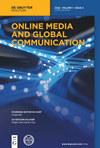社交媒体与年轻人的政治参与:在动员和分散注意力之间
引用次数: 9
摘要
学者们非常希望社交媒体的使用能够促进年轻人的民主参与。然而,这项研究在很大程度上忽略了社交媒体的非政治性、娱乐性使用。在这篇文章中,我的理论是,社交媒体的使用会显著抑制政治参与,因为总的来说,年轻人主要是出于非政治目的使用社交媒体,这会分散注意力,而不是动员起来。我使用来自美国、德国、瑞士和日本的汇总数据,通过比较年轻人的相对选民投票率和社交媒体使用数据来说明这一论点。数据显示,这些国家出现了所谓的社交媒体政治参与悖论:尽管年轻人使用社交媒体的人数激增,但年轻人和老一辈之间的投票率差距并没有明显缩小,而且大量研究表明,社交媒体的使用促进了线下政治参与。在试图理解社交媒体对全球民主的影响时,需要重新引入以娱乐为导向的内容。原创性/价值本文挑战了社交媒体使用和政治参与的主流研究范式。它敦促未来的研究从理论上发展、描述和经验上测试一个全面的模型,以了解社交媒体的使用如何具有动员和分散注意力的潜力。本文章由计算机程序翻译,如有差异,请以英文原文为准。
Social Media and the Political Engagement of Young Adults: Between Mobilization and Distraction
Abstract Purpose Scholars have expressed great hopes that social media use can foster the democratic engagement of young adults. However, this research has largely ignored non-political, entertainment-oriented uses of social media. In this essay, I theorize that social media use can significantly dampen political engagement because, by and large, young adults use social media primarily for non-political purposes, which distracts rather than mobilizes. Design/methodology/approach I illustrate this argument using aggregate level data from the U.S., Germany, Switzerland, and Japan by comparing relative voter turnout and social media use data of young adults. Findings Data suggest a so called Social Media Political Participation paradox in those countries: The gap in voter turnout between young adults and older generations has not significantly decreased, despite a skyrocketing rise of social media use on the side of young adults, and the overwhelming research evidence that social media use fosters offline political participation. Implications When trying to understand the implications of social media for democracy across the globe, entertainment-oriented content needs to be brought back in. Originality/value This essay challenges the dominant research paradigm on social media use and political participation. It urges future research to theoretically develop, describe, and empirically test a comprehensive model of how social media use has the potential to mobilize and to distract.
求助全文
通过发布文献求助,成功后即可免费获取论文全文。
去求助
来源期刊

Online Media and Global Communication
Communication, Media Studies, Internet Studies, International Studies, International Relations-
自引率
0.00%
发文量
0
期刊介绍:
Online Media and Global Communication (OMGC) is a new venue for high quality articles on theories and methods about the role of online media in global communication. This journal is sponsored by the Center for Global Public Opinion Research of China and School of Journalism and Communication, Shanghai International Studies University, China. It is published solely online in English. The journal aims to serve as an academic bridge in the research of online media and global communication between the dominating English-speaking world and the non-English speaking world that has remained mostly invisible due to language barriers. Through its structured abstracts for all research articles and uniform keyword system in the United Nations’ official six languages plus Japanese and German (Arabic, Chinese, English, French, Russian, Spanish, Japanese, and German), the journal provides a highly accessible platform to users worldwide. Its unique dual track single-blind and double-blind review system facilitates manuscript reviews with different levels of author identities. OMGC publishes review essays on the state-of-the-art in online media and global communication research in different countries and regions, original research papers on topics related online media and global communication and translated articles from non-English speaking Global South. It strives to be a leading platform for scientific exchange in online media and global communication.
For events and more, consider following us on Twitter at https://twitter.com/OMGCJOURNAL.
Topics
OMGC publishes high quality, innovative and original research on global communication especially in the use of global online media platforms such as Facebook, TikTok, YouTube, Twitter, Instagram, WhatsApp, Weibo, WeChat, Wikipedia, web sites, blogs, etc. This journal will address the contemporary concerns about the effects and operations of global digital media platforms on international relations, international public opinion, fake news and propaganda dissemination, diaspora communication, consumer behavior as well as the balance of voices in the world. Comparative research across countries are particularly welcome. Empirical research is preferred over conceptual papers.
Article Formats
In addition to the standard research article format, the Journal includes the following formats:
● One translation paper selected from Non-English Journals that with high quality as “Gems from the Global South” per issue
● One review essay on current state of research in online media and global communication in a country or region
 求助内容:
求助内容: 应助结果提醒方式:
应助结果提醒方式:


